Unit 1 What’s the matter(SectionA Grammar Focus-4c)课件(共39张PPT)
文档属性
| 名称 | Unit 1 What’s the matter(SectionA Grammar Focus-4c)课件(共39张PPT) | 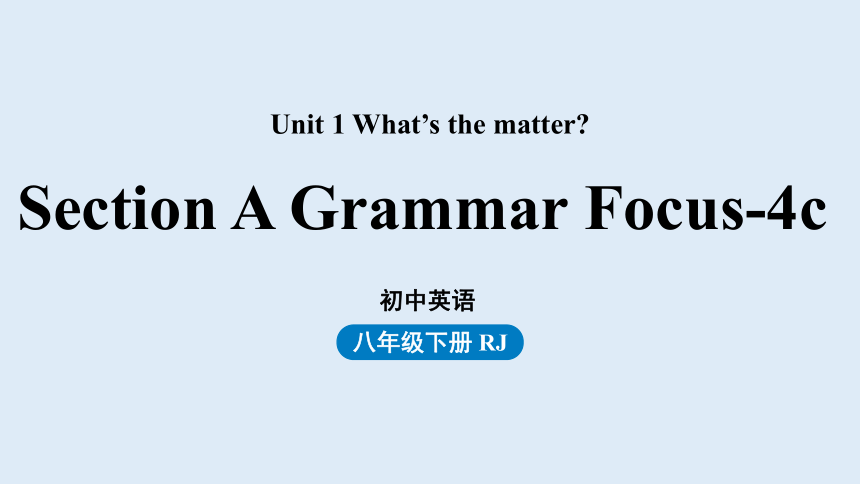 | |
| 格式 | zip | ||
| 文件大小 | 749.0KB | ||
| 资源类型 | 教案 | ||
| 版本资源 | 人教新目标(Go for it)版 | ||
| 科目 | 英语 | ||
| 更新时间 | 2021-12-02 11:51:09 | ||
图片预览

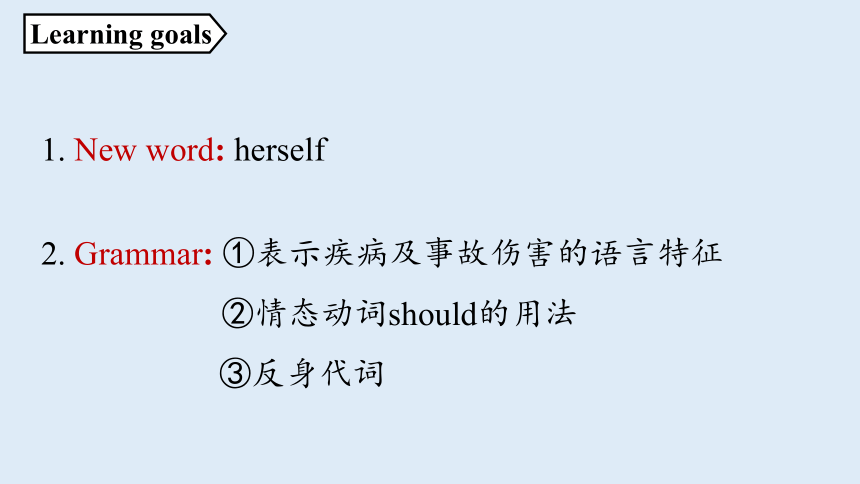
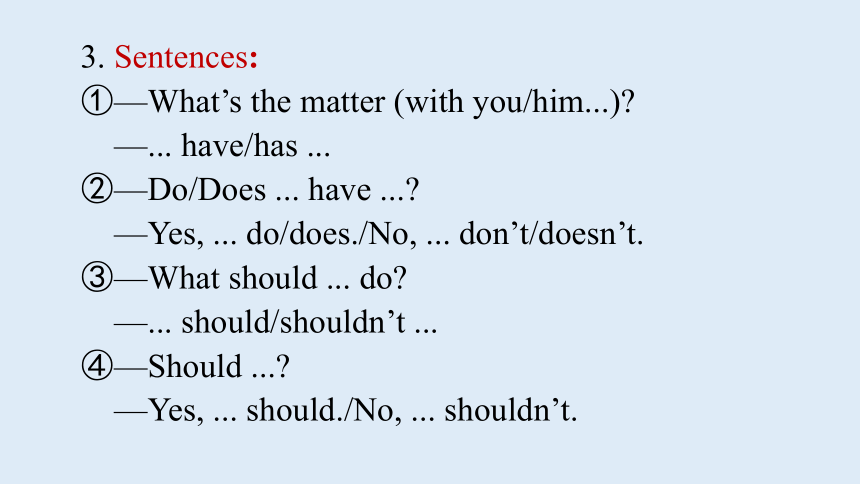
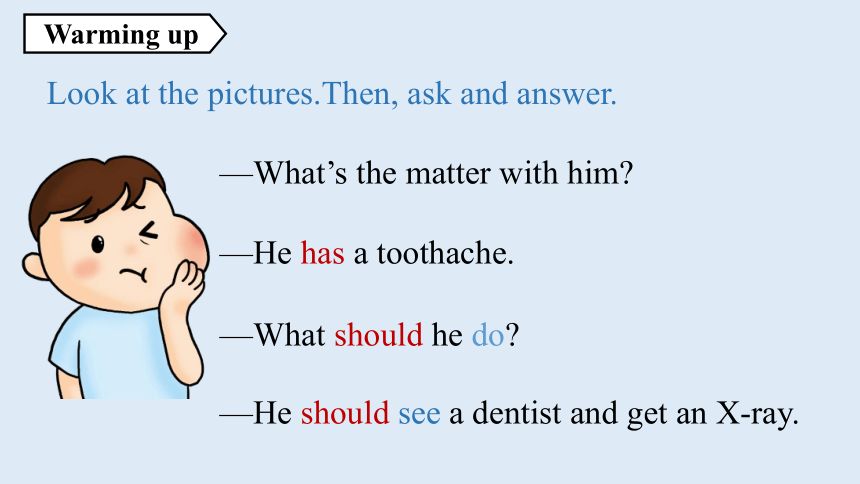
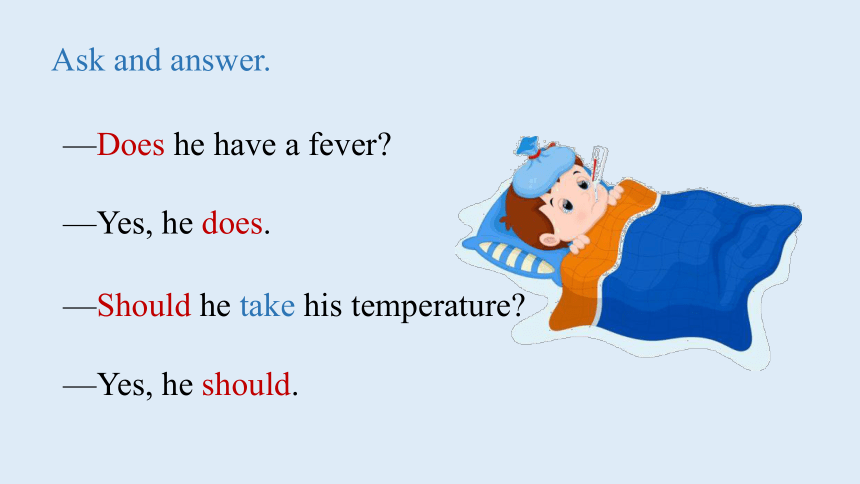
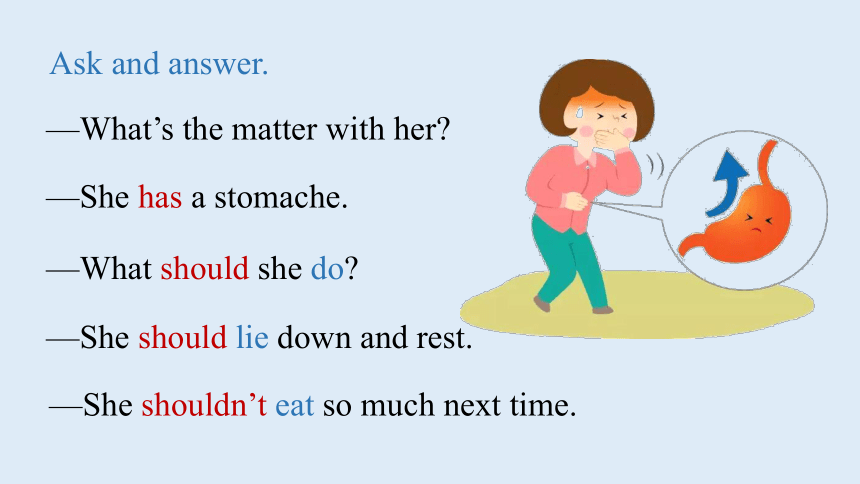
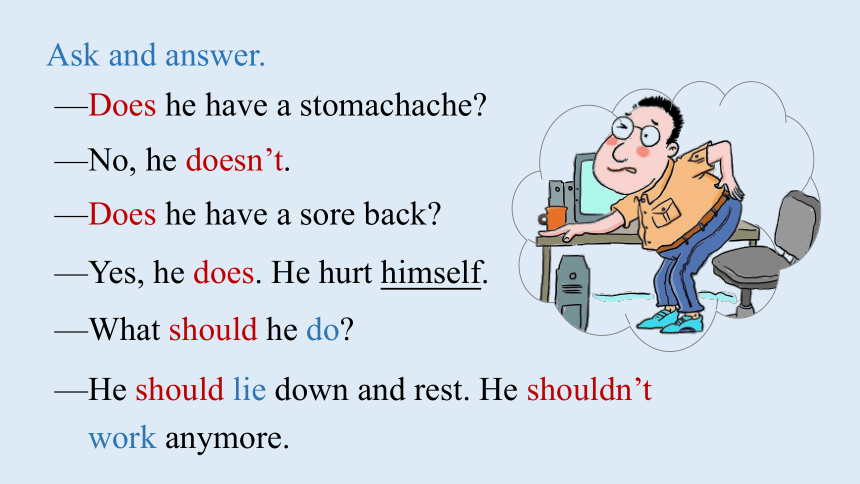
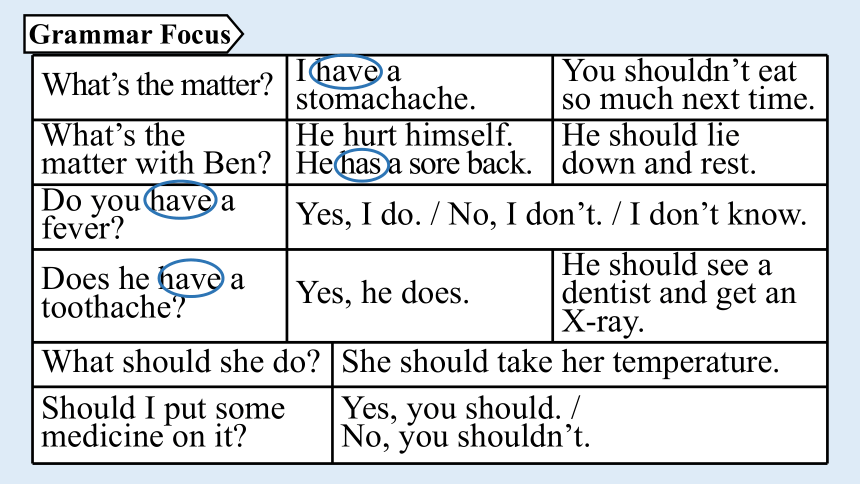
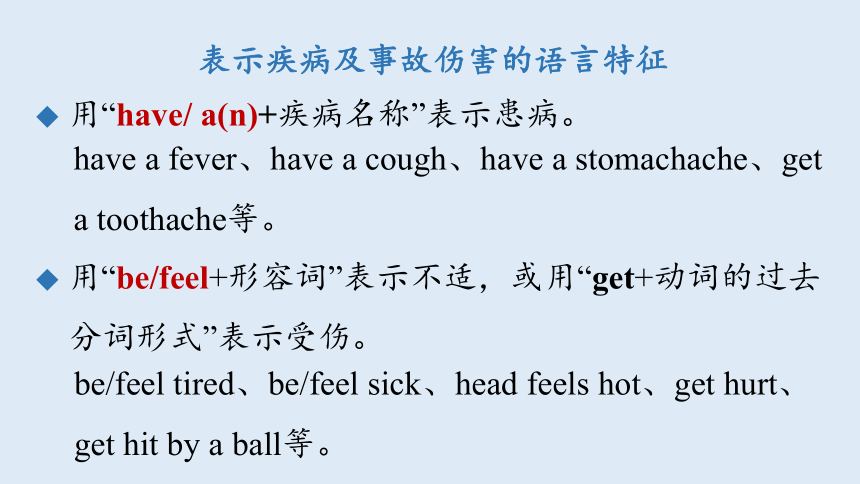
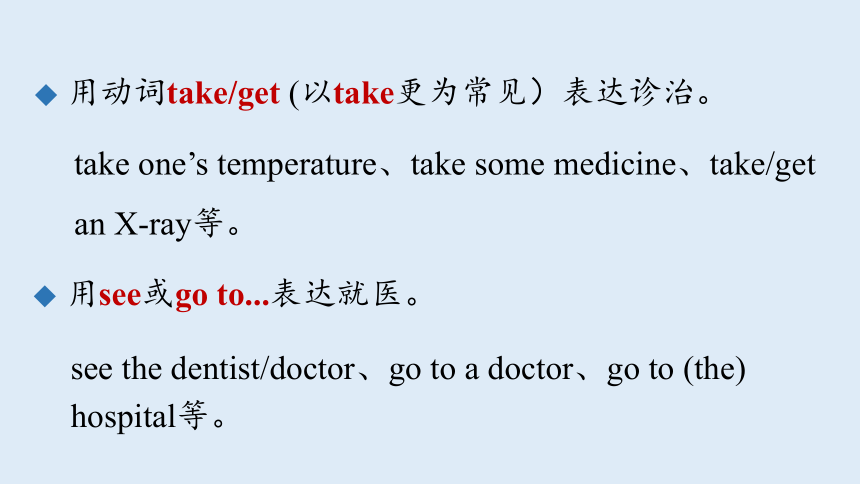
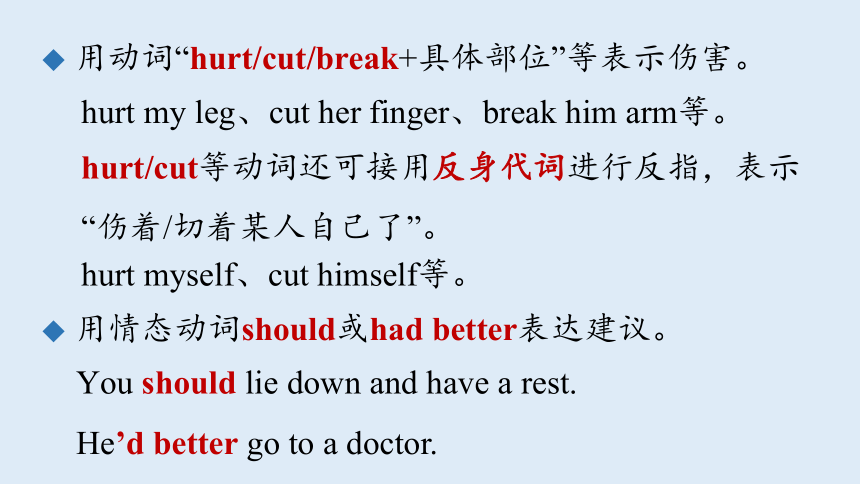
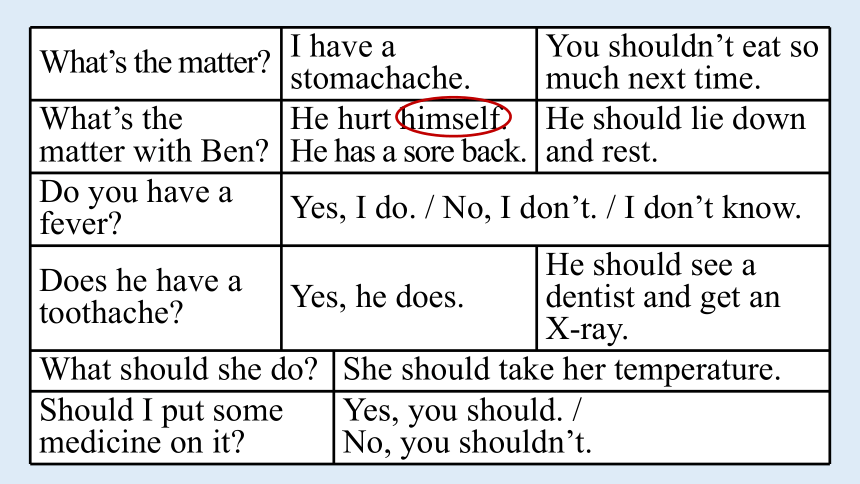
文档简介
(共39张PPT)
Section A Grammar Focus-4c
Unit 1 What’s the matter
八年级下册 RJ
初中英语
1. New word: herself
2. Grammar: ①表示疾病及事故伤害的语言特征
②情态动词should的用法
③反身代词
Learning goals
3. Sentences:
①—What’s the matter (with you/him...)
—... have/has ...
②—Do/Does ... have ...
—Yes, ... do/does./No, ... don’t/doesn’t.
③—What should ... do
—... should/shouldn’t ...
④—Should ...
—Yes, ... should./No, ... shouldn’t.
Look at the pictures.Then, ask and answer.
—What’s the matter with him
—He has a toothache.
—He should see a dentist and get an X-ray.
—What should he do
Warming up
Ask and answer.
—Does he have a fever
—Yes, he does.
—Yes, he should.
—Should he take his temperature
Ask and answer.
—What’s the matter with her
—She has a stomache.
—What should she do
—She should lie down and rest.
—She shouldn’t eat so much next time.
Ask and answer.
—Does he have a stomachache
—No, he doesn’t.
—Yes, he does. He hurt himself.
—Does he have a sore back
—What should he do
—He should lie down and rest. He shouldn’t
work anymore.
What’s the matter I have a stomachache. You shouldn’t eat so much next time.
What’s the matter with Ben He hurt himself. He has a sore back. He should lie down and rest.
Do you have a fever Yes, I do. / No, I don’t. / I don’t know. Does he have a toothache Yes, he does. He should see a dentist and get an X-ray.
What should she do She should take her temperature. Should I put some medicine on it Yes, you should. / No, you shouldn’t.
Grammar Focus
◆ 用“have/ a(n)+疾病名称”表示患病。
表示疾病及事故伤害的语言特征
have a fever、have a cough、have a stomachache、get a toothache等。
◆ 用“be/feel+形容词”表示不适,或用“get+动词的过去
分词形式”表示受伤。
be/feel tired、be/feel sick、head feels hot、get hurt、get hit by a ball等。
◆ 用动词take/get (以take更为常见)表达诊治。
take one’s temperature、take some medicine、take/get an X-ray等。
◆ 用see或go to...表达就医。
see the dentist/doctor、go to a doctor、go to (the) hospital等。
◆ 用动词“hurt/cut/break+具体部位”等表示伤害。
hurt my leg、cut her finger、break him arm等。
hurt/cut等动词还可接用反身代词进行反指,表示“伤着/切着某人自己了”。
hurt myself、cut himself等。
◆ 用情态动词should或had better表达建议。
You should lie down and have a rest.
He’d better go to a doctor.
What’s the matter I have a stomachache. You shouldn’t eat so much next time.
What’s the matter with Ben He hurt himself. He has a sore back. He should lie down and rest.
Do you have a fever Yes, I do. / No, I don’t. / I don’t know. Does he have a toothache Yes, he does. He should see a dentist and get an X-ray.
What should she do She should take her temperature. Should I put some medicine on it Yes, you should. / No, you shouldn’t.
表示反射或强调的代词叫作反身代词。第一、二人称的反身代词由形容词性物主代词加后缀-self或-selves构成,第三人称的反身代词由人称代词的宾格加后缀
-self或-selves构成。
反身代词的用法
反身代词
Jenny cut herself.
Did you hurt yourself playing soccer
语法概述
例句
第一人称 第二人称 第三人称
单数 myself 我自己 yourself 你自己 himself 他自己
herself 她自己
itself 它自己
复数 ourselves 我们自己 yourselves 你们自己 themselves
他(她、它)们自己
特例:不定代词one的反身代词是oneself 反身代词的构成
反身代词可放在及物动词(短语)或介词的后面作宾语,强调宾语和主语是相同的人或物。
1、作及物动词(短语)的宾语,常用于 teach、hurt、enjoy、dress、buy、help、look after、take care of 等后面。
反身代词作宾语
We must look after ourselves very well. 我们必须好好照顾自己。
Tom taught himself math. 汤姆自学了数学。
2.作介词的宾语,常用于 by、except、to、for 等后面。
Mary said to herself, “ What should I do ”
玛丽自言自语:“我该怎么办呢?”
The old man lives by himself in the countryside.
这位老人独自生活在乡下。
I never thought that he himself would come. 我从来没有想过他会亲自来。
I spoke to the manager himself. 我和经理本人谈过了。
反身代词在句中通常作名词、代词的同位语,译作“本身;亲自”。反身代词作主语的同位语时,应放在主语之后或句子末尾;作宾语的同位语时,应放在宾语之后。
作从句的主语he的同位语
作宾语manager的同位语
反身代词作同位语
反身代词放在be动词、feel、look、seem等系动词后作表语,可以用来描述身体或精神状态。
反身代词作表语
I’m not myself today. 今天我感觉不舒服。
I am feeling myself again. 我觉得健康如昔。
(all) by oneself 独自,单独 enjoy oneself 玩得高兴;
过得愉快
for oneself 亲自;为自己 dress oneself 给自己穿衣服
help oneself to... 为(自己或某人)取用 teach oneself 自学
lose oneself in 沉浸于 hurt oneself 伤着自己
含有反身代词的一些固定短语
反身代词的用法
反身代词表自身,句中用法可三分。
动介后面用作宾,表示动作回自身。
句中强调同位语,主语宾语后边跟。
巧学妙记
What’s the matter I have a stomachache. You shouldn’t eat so much next time. What’s the matter with Ben He hurt himself. He has a sore back. He should lie down and rest. Do you have a fever Yes, I do. / No, I don’t. / I don’t know. Does he have a toothache Yes, he does. He should see a dentist and get an X-ray.
What should she do She should take her temperature. Should I put some medicine on it Yes, you should. /No, you shouldn’t.
情态动词should意为“应该;应当”,其后接动词原形,且没有人称和数的变化。其否定形式是在should后加not。
情态动词 should的用法
should
疑问句:Should we go now
否定句:You shouldn’t eat so much next time.
陈述句:You should have a rest.
语法概述
例句
1. 表示征询意见和提出建议
Should I put the bag here 我应该把包放在这里吗?
We should do sports every day. 我们应该每天做运动。
2. 表示推测
He should be a policeman. 他应该是一名警察。
Sam should be in the library. 萨姆应该在图书馆。
3. 表示义务或责任
We should study hard. 我们应该努力学习。
You should finish your homework this evening. 你应该在今晚完成你的家庭作业。
4. 表示拒绝、愤怒或惊奇等,常用于疑问句或感叹句中
Why should he do that 他为何做出那种事情?
1. A: I hurt ____________________________ when I
played basketball yesterday. What _______ I do
B: You _______ see a doctor and get an X-ray.
2. A: _______ the matter
B: My sister and I _______ sore throats. _______ we
go to school A: No, you _________.
3. A: _______ Mike _______ a fever
B: No, he _______. He _______ a stomachache.
A: He _______ drink some hot tea.
myself/my arm/my leg/ my back
4a Fill in the blanks and practice the conversations.
should
should
What’s
have
Should
shouldn’t
Does
have
doesn’t
has
should
Presentation
1. Jenny cut herself.
She should (get an X-ray / put some medicine on the cut).
My advice: __________________________________
2. Kate has a toothache.
She should ( see a dentist / get some sleep).
My advice: __________________________________
She should dress the cut for herself.
4b Circle the best advice for these health problems. Then
add your own advice.
She should brush her teeth with salt water.
3. Mary and Sue have colds.
They shouldn’t ( sleep / exercise).
My advice: ____________________________
4. Bob has a sore back.
He should ( lie down and rest / take his temperature).
My advice: _____________________________
They should drink more hot water.
He should go to a doctor.
4c One student mimes a problem. The other students in your group guess the problem and give advice.
Name Problem Advice
Liu Peng fall down go home and rest
A: What’s the matter Did
you hurt yourself
playing soccer
B: No, I didn’t.
C: Did you fall down
B: Yes, I did.
D: You should go home
and get some rest.
Did you fall down (教材P4 4c)
fall down为不及物动词短语,其后不能直接跟宾语。fall down from 表示“从……摔下”,相当于fall off。
fall down 摔倒;落下
Little babies often fall down when they are learning to walk.
During autumn, the leaves change color and fall down from (=fall off ) the trees.
Language point
一、单项选择
1. (2021 天津中考) People_____talk on a mobile phone while they are driving.
A. shouldn’t B. needn’t C. must D. can
2. (2021 吉林中考) My mother made some zongzi by _____on the Dragon Boat Festival.
A. she B. hers C. herself
C
A
Exercises
3. (2021 武汉中考改编) — Only ten tickets What do you mean There_____ be twelve.
— Sorry, Linda. Jacky and Tim took two tickets away.
A. shouldn’t B. needn’t C. should D. need
4. (2021 云南中考改编) When I fell and hurt , my mother encouraged me to stand up and gave me a hug.
A. I B. my C. me D. myself
C
D
5. (2021 温州中考改编) She is good at cooking. Children all like the food she makes. They enjoy_____at school.
A. they B. themselves C. them D. their
6. (2021 昆明中考) Tai chi, part of Chinese culture, is an
exercise which helps people improve_____ in health.
A. themselves B. ourselves
C. itself D. myself
A
B
1. We should _______ (keep) away from the Internet.
2. (2021 盐城中考) Sandy listened intently to the classical
music, losing _______ (her) in its beauty.
3. Our teachers often tell us how to teach _________ (we).
4. (2021 金华中考改编) Bob told his parents that he could look after _______ (he) even when he was home alone.
5. My uncle _____ (have) a stomachache.
6.You shouldn’t ____ (eat) so much next time.
二、用所给词的适当形式填空
keep
herself
ourselves
himself
has
eat
1.我应该量下体温吗?
_______ I _______ my temperature
2.你打篮球时伤着自己了吗?
Did you _____ ________ playing basketball
3.你应该喝大量的水。
You _______ ______ lots of water.
4.我想要去看医生,因为我发烧了。
I want to see a doctor because I ______ _____ ______.
三、完成句子
Should take
hurt yourself
should drink
have a fever
表述疾病及事故
用情态动词should或had better表达建议
用see或go to...表达就医。
have/get a(an)+疾病名称,表示患病。
be/feel+形容词,表示不适。
用动词“hurt/cut/break+具体部位”等,表示伤害。
用动词take/get表达诊治。
Summary
should
表示推测
表征询意见和提出建议
表示义务或责任
表示拒绝、愤怒或惊奇等,常用于疑
问句或感叹句中
意为“应该;应当”
后接动词原形
没有人称和数的变化
否定:should not / shouldn’t
概述
用法
反身代词
反身代词作同位语,意为“本身;亲自”
单数:myself, yourself,
himself, herself, itself
反身代词作表语,用于描述身体或精神状态
作及物动词(短语)的宾语
表示反射或强调
构成
概述
用法
作介词宾语
反身代词作宾语
复数:ourselves, yourselves, themselves
特殊:oneself
1. Review the use of “should” and “ reflexive pronouns ”.
2. Make sentences with “should” and “ reflexive
pronouns ”, no less than five.
3. Preview the new words in Section B(1a-1d).
Homework
THANKS
谢谢聆听!
Section A Grammar Focus-4c
Unit 1 What’s the matter
八年级下册 RJ
初中英语
1. New word: herself
2. Grammar: ①表示疾病及事故伤害的语言特征
②情态动词should的用法
③反身代词
Learning goals
3. Sentences:
①—What’s the matter (with you/him...)
—... have/has ...
②—Do/Does ... have ...
—Yes, ... do/does./No, ... don’t/doesn’t.
③—What should ... do
—... should/shouldn’t ...
④—Should ...
—Yes, ... should./No, ... shouldn’t.
Look at the pictures.Then, ask and answer.
—What’s the matter with him
—He has a toothache.
—He should see a dentist and get an X-ray.
—What should he do
Warming up
Ask and answer.
—Does he have a fever
—Yes, he does.
—Yes, he should.
—Should he take his temperature
Ask and answer.
—What’s the matter with her
—She has a stomache.
—What should she do
—She should lie down and rest.
—She shouldn’t eat so much next time.
Ask and answer.
—Does he have a stomachache
—No, he doesn’t.
—Yes, he does. He hurt himself.
—Does he have a sore back
—What should he do
—He should lie down and rest. He shouldn’t
work anymore.
What’s the matter I have a stomachache. You shouldn’t eat so much next time.
What’s the matter with Ben He hurt himself. He has a sore back. He should lie down and rest.
Do you have a fever Yes, I do. / No, I don’t. / I don’t know. Does he have a toothache Yes, he does. He should see a dentist and get an X-ray.
What should she do She should take her temperature. Should I put some medicine on it Yes, you should. / No, you shouldn’t.
Grammar Focus
◆ 用“have/ a(n)+疾病名称”表示患病。
表示疾病及事故伤害的语言特征
have a fever、have a cough、have a stomachache、get a toothache等。
◆ 用“be/feel+形容词”表示不适,或用“get+动词的过去
分词形式”表示受伤。
be/feel tired、be/feel sick、head feels hot、get hurt、get hit by a ball等。
◆ 用动词take/get (以take更为常见)表达诊治。
take one’s temperature、take some medicine、take/get an X-ray等。
◆ 用see或go to...表达就医。
see the dentist/doctor、go to a doctor、go to (the) hospital等。
◆ 用动词“hurt/cut/break+具体部位”等表示伤害。
hurt my leg、cut her finger、break him arm等。
hurt/cut等动词还可接用反身代词进行反指,表示“伤着/切着某人自己了”。
hurt myself、cut himself等。
◆ 用情态动词should或had better表达建议。
You should lie down and have a rest.
He’d better go to a doctor.
What’s the matter I have a stomachache. You shouldn’t eat so much next time.
What’s the matter with Ben He hurt himself. He has a sore back. He should lie down and rest.
Do you have a fever Yes, I do. / No, I don’t. / I don’t know. Does he have a toothache Yes, he does. He should see a dentist and get an X-ray.
What should she do She should take her temperature. Should I put some medicine on it Yes, you should. / No, you shouldn’t.
表示反射或强调的代词叫作反身代词。第一、二人称的反身代词由形容词性物主代词加后缀-self或-selves构成,第三人称的反身代词由人称代词的宾格加后缀
-self或-selves构成。
反身代词的用法
反身代词
Jenny cut herself.
Did you hurt yourself playing soccer
语法概述
例句
第一人称 第二人称 第三人称
单数 myself 我自己 yourself 你自己 himself 他自己
herself 她自己
itself 它自己
复数 ourselves 我们自己 yourselves 你们自己 themselves
他(她、它)们自己
特例:不定代词one的反身代词是oneself 反身代词的构成
反身代词可放在及物动词(短语)或介词的后面作宾语,强调宾语和主语是相同的人或物。
1、作及物动词(短语)的宾语,常用于 teach、hurt、enjoy、dress、buy、help、look after、take care of 等后面。
反身代词作宾语
We must look after ourselves very well. 我们必须好好照顾自己。
Tom taught himself math. 汤姆自学了数学。
2.作介词的宾语,常用于 by、except、to、for 等后面。
Mary said to herself, “ What should I do ”
玛丽自言自语:“我该怎么办呢?”
The old man lives by himself in the countryside.
这位老人独自生活在乡下。
I never thought that he himself would come. 我从来没有想过他会亲自来。
I spoke to the manager himself. 我和经理本人谈过了。
反身代词在句中通常作名词、代词的同位语,译作“本身;亲自”。反身代词作主语的同位语时,应放在主语之后或句子末尾;作宾语的同位语时,应放在宾语之后。
作从句的主语he的同位语
作宾语manager的同位语
反身代词作同位语
反身代词放在be动词、feel、look、seem等系动词后作表语,可以用来描述身体或精神状态。
反身代词作表语
I’m not myself today. 今天我感觉不舒服。
I am feeling myself again. 我觉得健康如昔。
(all) by oneself 独自,单独 enjoy oneself 玩得高兴;
过得愉快
for oneself 亲自;为自己 dress oneself 给自己穿衣服
help oneself to... 为(自己或某人)取用 teach oneself 自学
lose oneself in 沉浸于 hurt oneself 伤着自己
含有反身代词的一些固定短语
反身代词的用法
反身代词表自身,句中用法可三分。
动介后面用作宾,表示动作回自身。
句中强调同位语,主语宾语后边跟。
巧学妙记
What’s the matter I have a stomachache. You shouldn’t eat so much next time. What’s the matter with Ben He hurt himself. He has a sore back. He should lie down and rest. Do you have a fever Yes, I do. / No, I don’t. / I don’t know. Does he have a toothache Yes, he does. He should see a dentist and get an X-ray.
What should she do She should take her temperature. Should I put some medicine on it Yes, you should. /No, you shouldn’t.
情态动词should意为“应该;应当”,其后接动词原形,且没有人称和数的变化。其否定形式是在should后加not。
情态动词 should的用法
should
疑问句:Should we go now
否定句:You shouldn’t eat so much next time.
陈述句:You should have a rest.
语法概述
例句
1. 表示征询意见和提出建议
Should I put the bag here 我应该把包放在这里吗?
We should do sports every day. 我们应该每天做运动。
2. 表示推测
He should be a policeman. 他应该是一名警察。
Sam should be in the library. 萨姆应该在图书馆。
3. 表示义务或责任
We should study hard. 我们应该努力学习。
You should finish your homework this evening. 你应该在今晚完成你的家庭作业。
4. 表示拒绝、愤怒或惊奇等,常用于疑问句或感叹句中
Why should he do that 他为何做出那种事情?
1. A: I hurt ____________________________ when I
played basketball yesterday. What _______ I do
B: You _______ see a doctor and get an X-ray.
2. A: _______ the matter
B: My sister and I _______ sore throats. _______ we
go to school A: No, you _________.
3. A: _______ Mike _______ a fever
B: No, he _______. He _______ a stomachache.
A: He _______ drink some hot tea.
myself/my arm/my leg/ my back
4a Fill in the blanks and practice the conversations.
should
should
What’s
have
Should
shouldn’t
Does
have
doesn’t
has
should
Presentation
1. Jenny cut herself.
She should (get an X-ray / put some medicine on the cut).
My advice: __________________________________
2. Kate has a toothache.
She should ( see a dentist / get some sleep).
My advice: __________________________________
She should dress the cut for herself.
4b Circle the best advice for these health problems. Then
add your own advice.
She should brush her teeth with salt water.
3. Mary and Sue have colds.
They shouldn’t ( sleep / exercise).
My advice: ____________________________
4. Bob has a sore back.
He should ( lie down and rest / take his temperature).
My advice: _____________________________
They should drink more hot water.
He should go to a doctor.
4c One student mimes a problem. The other students in your group guess the problem and give advice.
Name Problem Advice
Liu Peng fall down go home and rest
A: What’s the matter Did
you hurt yourself
playing soccer
B: No, I didn’t.
C: Did you fall down
B: Yes, I did.
D: You should go home
and get some rest.
Did you fall down (教材P4 4c)
fall down为不及物动词短语,其后不能直接跟宾语。fall down from 表示“从……摔下”,相当于fall off。
fall down 摔倒;落下
Little babies often fall down when they are learning to walk.
During autumn, the leaves change color and fall down from (=fall off ) the trees.
Language point
一、单项选择
1. (2021 天津中考) People_____talk on a mobile phone while they are driving.
A. shouldn’t B. needn’t C. must D. can
2. (2021 吉林中考) My mother made some zongzi by _____on the Dragon Boat Festival.
A. she B. hers C. herself
C
A
Exercises
3. (2021 武汉中考改编) — Only ten tickets What do you mean There_____ be twelve.
— Sorry, Linda. Jacky and Tim took two tickets away.
A. shouldn’t B. needn’t C. should D. need
4. (2021 云南中考改编) When I fell and hurt , my mother encouraged me to stand up and gave me a hug.
A. I B. my C. me D. myself
C
D
5. (2021 温州中考改编) She is good at cooking. Children all like the food she makes. They enjoy_____at school.
A. they B. themselves C. them D. their
6. (2021 昆明中考) Tai chi, part of Chinese culture, is an
exercise which helps people improve_____ in health.
A. themselves B. ourselves
C. itself D. myself
A
B
1. We should _______ (keep) away from the Internet.
2. (2021 盐城中考) Sandy listened intently to the classical
music, losing _______ (her) in its beauty.
3. Our teachers often tell us how to teach _________ (we).
4. (2021 金华中考改编) Bob told his parents that he could look after _______ (he) even when he was home alone.
5. My uncle _____ (have) a stomachache.
6.You shouldn’t ____ (eat) so much next time.
二、用所给词的适当形式填空
keep
herself
ourselves
himself
has
eat
1.我应该量下体温吗?
_______ I _______ my temperature
2.你打篮球时伤着自己了吗?
Did you _____ ________ playing basketball
3.你应该喝大量的水。
You _______ ______ lots of water.
4.我想要去看医生,因为我发烧了。
I want to see a doctor because I ______ _____ ______.
三、完成句子
Should take
hurt yourself
should drink
have a fever
表述疾病及事故
用情态动词should或had better表达建议
用see或go to...表达就医。
have/get a(an)+疾病名称,表示患病。
be/feel+形容词,表示不适。
用动词“hurt/cut/break+具体部位”等,表示伤害。
用动词take/get表达诊治。
Summary
should
表示推测
表征询意见和提出建议
表示义务或责任
表示拒绝、愤怒或惊奇等,常用于疑
问句或感叹句中
意为“应该;应当”
后接动词原形
没有人称和数的变化
否定:should not / shouldn’t
概述
用法
反身代词
反身代词作同位语,意为“本身;亲自”
单数:myself, yourself,
himself, herself, itself
反身代词作表语,用于描述身体或精神状态
作及物动词(短语)的宾语
表示反射或强调
构成
概述
用法
作介词宾语
反身代词作宾语
复数:ourselves, yourselves, themselves
特殊:oneself
1. Review the use of “should” and “ reflexive pronouns ”.
2. Make sentences with “should” and “ reflexive
pronouns ”, no less than five.
3. Preview the new words in Section B(1a-1d).
Homework
THANKS
谢谢聆听!
同课章节目录
- Unit 1 What's the matter?
- Section A
- Section B
- Unit 2 I'll help to clean up the city parks.
- Section A
- Section B
- Unit 3 Could you please clean your room?
- Section A
- Section B
- Unit 4 Why don't you talk to your parents?
- Section A
- Section B
- Unit 5 What were you doing when the rainstorm came
- Section A
- Section B
- Review of Units 1-5
- Unit 6 An old man tried to move the mountains.
- Section A
- Section B
- Unit 7 What's the highest mountain in the world?
- Section A
- Section B
- Unit 8 Have you read Treasure Island yet?
- Section A
- Section B
- Unit 9 Have you ever been to a museum?
- Section A
- Section B
- Unit 10 I've had this bike for three years.
- Section A
- Section B
